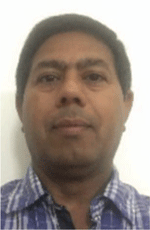Integrating multi-disciplinary data for building fit-for-purpose 3D mechanical earth model
Peter G. Boothby A C , Ratih Puspitasari B , Sanjay Thakur A , Zachariah John Pallikathekathil B and Chris Walton AA Chevron Australia Pty. Ltd., 250 St. Georges Terrace, Perth 6000, Australia.
B Schlumberger Australia Pty. Ltd., Level 5, 256 St. Georges Terrace, Perth 6000, Australia.
C Corresponding author. Email: pboothby@chevron.com
The APPEA Journal 59(2) 856-859 https://doi.org/10.1071/AJ18153
Accepted: 18 February 2019 Published: 17 June 2019
Abstract
Understanding the influence of geomechanics early in the field development phase facilitates reservoir management planning. To capture complex geology and associated field development, a 3D mechanical earth model (3D MEM) with finite element method (FEM) approach was selected to analyse the geomechanical-related risks associated with two fields in the North West Shelf, Australia. The 3D MEMs were constructed using geological static models, and seismic-derived horizons and faults. The 3D properties were propagated based on core-calibrated 1D properties and controlled by stratigraphy, 3D facies and seismic inversion volumes. The FEM was used to calculate the equilibrium of stresses and strains within the 3D MEMs. The 3D properties and pre-production stresses were validated in blind test wells before forward modelling. The 3D MEMs were linked to the dynamic reservoir models to capture the pressure evolution throughout the field lifecycle. The results were used to analyse the risks associated with compaction, subsidence, fault instability, completion integrity and drilling stability of infill wells through depleted reservoirs. The results provided insight in managing the risk early in field development stage. The study’s largest challenge was integrating a large volume of data to ensure that the structural complexity and rock heterogeneity were captured and consistent with the geological understanding of the field. A multi-disciplinary team of earth scientists and reservoir and geomechanics engineers worked together, and the value of data integration, good communication and teamwork were key success factors. Lessons learned and best practices were captured throughout the study and provided valuable feedback for future works.
Keywords: compaction, completion integrity, fault stability, geomechanics, subsidence, well integrity, wellbore stability.

Peter Boothby obtained his BSc (Hons) from Flinders University in South Australia in 1984. He has worked in the oil and gas industry for more than 35 years as a consultant Wellsite/Operations Geologist with recent emphasis on pore pressure and wellbore stability 1D and 3D modelling. Peter is currently employed by Chevron Australia as a senior Pore Pressure and Wellbore Stability Analyst and has been in this position for the last 8 years. He is a member of SPE. |

Ratih Puspitasari has over 15 years of diverse experience in oil and gas, working in projects related to geomechanics, reservoir engineering, production technology, well stimulation, drilling and well integrity. She obtained an MSc in Petroleum Engineering from Curtin University in 2009. Ratih is currently a Senior Geomechanics Engineer with Schlumberger Australia, focusing on field-scale 4D reservoir geomechanics modelling. She is a member of SPE. |

Sanjay Thakur is a Geomechanics Specialist with Chevron Australia. He has more than 23 years of experience in the oil and gas industry with 11 years in geomechanics. He did his MTech in Applied Geology from DHSG University, Sagar, India. He has held various technical positions in mudlogging, MWD, real-time pore pressure and geomechanical analysis. In his current position he is engaged in pore pressure analysis, construction of 1D and 3D geomechanical models and QA/QC of rock mechanical tests. He is a member of SPE. |

Zachariah (Zach) John Pallikathekathil is Geomechanics Team Leader with Schlumberger Australia. He has more than 30 years of experience in the oil and gas industry with over 10 years in geomechanics. He did his BTech in Mechanical Engineering from IIT, Delhi, with distinction and took electives from the School of Oil and Gas UWA Master’s Program. He is currently involved in rock testing design, construction of 1D, 3D and 4D mechanical earth models for addressing issues on wellbore stability (drilling), completion integrity (sanding and casing), compaction–subsidence and fault stability over the life of the oil and gas fields. He is a member of SPE and FESAus. |

Chris Walton obtained his MSc (Geophysics) from Curtin University in Western Australia in 2000. He has worked in the oil and gas industry as a geophysicist for more than 20 years. Chris is currently employed by Chevron Australia as a Development Geophysicist and has been with Chevron for 10 years, working in appraisal and development. |


